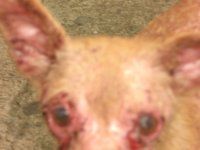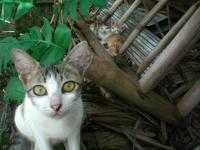The Real Poop On Inflammatory Bowel Disease
Sponsored Links
One of the more common diagnoses with which pets come to my practice is inflammatory bowel disease (IBD). A related problem that is also very common is colitis. The typical symptoms of IBD are chronic diarrhea and/or vomiting. Colitis generally presents with urgent, uncontrollable and frequent loose stools. These diagnoses are generally made by ruling out other diagnoses and confirmed by biopsy of the stomach or intestinal lining. I have seen many such animals. The guardians of these animals have usually spent a lot of money to find out what is wrong
with their companions only to be told that medications may be able to control the symptoms but that this will be a life long problem. As with many of the articles I write, I am here to shatter another conventional medical myth. Colitis and IBD are both curable conditions.
Medicine tends to lump all of these animals together in terms of treatment. Usually a special diet is prescribed along with anti–inflammatory medicines and occasionally antibiotics. The diet is usually a high fiber formula for colitis or a bland
, easily digested food for IBD. The anti–inflammatory drugs range from Sulfasalazine to prednisone. Metronidazole (Flagyl) is a commonly used antibiotic that also has anti–inflammatory effects. There are other medications that are employed as well but these are the most common. As with most conventional medical treatments, the symptoms usually improve very quickly. Unfortunately, there are many potential side effects to these drugs and the long term outlook is not very good. Rarely can animals get off the medicines without having relapses.
To take a holistic look at these problems, we first need to step back and think about the possible underlying causes. Veterinarians are correct to think about the diet being a problem. However, high fiber diets are just the opposite of what carnivores are designed to eat. Even though they may improve the symptoms, especially the diarrhea, they are only masking the problem and the animal will generally continue on a long slow decline in health. The so–called easy to digest pet foods are closer to the target than the high fiber foods. Carnivores naturally eat an easily digested, high protein (i.e. meat), low carbohydrate, low fiber diet. The problem is that the commercial products are NOT easily digested because they are cooked. I have discussed this in many articles. Cooked pet foods are more difficult to digest than raw ones. In addition, the bland
pet formulae have too high a carbohydrate content for a carnivore. Again, while the symptoms may improve on these foods, do not be fooled into thinking the problem is solved. Most animals' health will continue to degenerate on these products with or without symptoms.
The best nutritional approach is a fresh raw food diet based on meat, bones and vegetables. Pets with digestive problems often benefit dramatically from digestive enzymes and digestive bacteria supplement. I know of one cat that had been on medication for IBD for years when a new guardian adopted her. The cat was changed to a raw foods diet and the problem completely resolved. The cat has been taken off all of her medications. This cat's body suffered with years of prednisone that was totally unnecessary. This is unusual in that diet changes alone usually do not resolve IBD or colitis completely. Most of the time, the symptoms improve but the animal still has a sensitive stomach or intestines
. This is because the animal has a chronic disease process that cannot be eradicated by diet. The diet changes strengthen the system so that the symptoms are less life threatening but inklings of the problem remain.
The next step is to remove any toxic substances from the animal's regimen. This means reconsidering any and all drugs being given as well as looking at the environment for possible irritating factors.
To cure the chronic disease process, homeopathy must be employed. If the correct, individualized homeopathic remedy can be found, the digestive function will become much more stable. This is done by taking into account all of the seemingly unrelated physical and mental symptoms. The history of the individual, especially those procedures performed on the animal in the weeks preceding the onset of symptoms, is also very important. If the correct remedy is found, other changes can be seen. Emotional or behavioral improvements are not unusual. Other problems e.g. skin eruptions or discharge from the eyes will clear up. A case that comes to mind is a dog that we treated who was diagnosed by one of the best
(or at least one of the most expensive) animal hospitals in Florida. After THOUSANDS of dollars in tests, the diagnosis was colitis. The dog was approximately 6 years old at the time and 30 or so pounds overweight. His symptoms were very severe with frequent bouts of uncontrollable diarrhea. He was placed on a couple of drugs and sent home to live on these for the rest of his life. The guardian wanted something better and called me for a consultation. Within two weeks of the diet change, the dog was 75% better in terms of bowel function and was feeling better generally. No drugs were being given. After awhile it was obvious that the improvement had leveled off. He was much better, but still prone to bouts of diarrhea when stressed. At that point, a homeopathic remedy was given and he improved further. He did extremely well until a veterinarian convinced the guardian to give the dog his rabies vaccination despite my warnings that the rabies vaccine was probably a factor in his colitis. Within a day or two, the diarrhea was back. Another dose of remedy got him back on track. The dog is now eleven years old, looks better than he has in years, has lost the excess weight and only gets rare bouts of loose stools. I wonder how many giant breed dogs look better at eleven than at six with conventional medical care!
If you have a companion animal who has been diagnosed with IBD or colitis, don't despair. Seek assistance from a practitioner with a full time commitment to homeopathy. I suggest avoiding veterinarians with a mostly conventional medical practice. They generally don't have the training, experience or commitment to practice homeopathy. While homeopathy has the ability to cure these types of conditions, it is important to remember that not every patient can be cured. Individuals whose condition is very debilitated or who have had a lot of toxic drugging may not respond completely. If the animal is kept on commercial pet foods, the malnutrition may limit the healing response. Even in these circumstances, homeopathy is worth trying. Often, the patient will stabilize if not improve and the quality of life will be better.
- Russell Swift, DVM, Classical Homeopath
Feel Free To Read Another Article
Feel free to read another article or continue exploring the rest of my web site. Remember, you can also visit my question and answers also.
- Holistic Pet Health Articles
- Introduction To Natural Health And Nutrition For Pets
- Nutrition — The Raw Truth
- The Real Poop On Inflammatory Bowel Disease
- Chronic Renal Failure
- Clearing The Air About Flatulence
- Weight Loss: Is Your Pet Ready For Bikini Season?
- Seizure Disorders And Homeopathy
- Homeopathy And Behavioral Problems
- Vegetarian Feeding Of Dogs And Cats
- Pet Allergies
- Thunder and Lightning, Very Frightening, Or Not?
- Blood Tests: But The Tests Were Okay!
- Pet Dentistry: Filling You In On Dental Care
- Holistic Healing: Commitment or Commodity?
- Rimadyl — Wolf In Sheep's Clothing
- Flea Free Naturally
- Of Worms and Germs
- Not All That Itches Are Fleas
- Effects Of Symptom Suppression
- A Homeopath's Perspective On Topical Therapy
- Genes And Proteins: The Stuff Of Life
- Miasms — A Modern Understanding
- Vaccines — Good Medicine Or Bad Advice?
- Herings Law of Healing
- Causes Of Symptoms
- About Dr. Swift, DVM
 Meet Jumbo, the participant in
Meet Jumbo, the participant in 